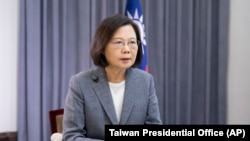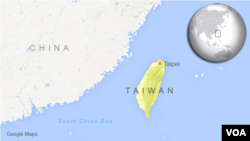In a signal that India-Taiwan economic ties are on the rise, Taipei this week announced it will expand its presence in the country by opening a representative office in Mumbai.
While New Delhi has maintained a low profile on political contacts with Taiwan, business ties between the two countries have been expanding in recent years.
India’s External Affairs Ministry spokesman, Arindam Bagchi, said Thursday that Taiwan’s plans to open the Mumbai center should be seen in the context of India’s policy, which “facilitates, promotes interactions with Taiwan in areas of trade, tourism, culture, education and other such people-to-people contacts and exchanges.”
Analysts point out that Taiwan’s move comes at a time when both countries have seen a sharp deterioration in ties with China.
The deepening tensions with Beijing have prompted Taiwanese companies to look at expanding bases outside China, while New Delhi wants to use the opportunity woo manufacturers seeking to diversify supply chains to India.
“This expansion of the Taiwanese presence in India can be seen in the context of its estrangement with Beijing,” Manoj Joshi, distinguished fellow at the Observer Research Foundation in New Delhi told VOA. “The Taiwanese are looking away from China for options in terms of their investments at countries like Vietnam or India.”
The Mumbai Taipei Economic and Cultural Center is expected to open next year and will be Taiwan’s third in India – it has one in New Delhi and one in the southern city of Chennai. Mumbai, India’s financial hub, is seen as key for businesses in India.
India, like most countries, does not have formal diplomatic ties with Taiwan and the Taiwanese representative offices serve as de facto diplomatic missions. Similarly, New Delhi’s office in Taipei, the India-Taipei Association, is headed by a senior diplomat.
Taiwan’s Foreign Affairs Ministry said Wednesday the aim of opening a center in Mumbai was to further advance “substantive ties” with India and “deepen exchanges and cooperation.” It noted “significant progress” in domains such as economics, trade, science and technology and critical supply chains.
The ministry statement said that while southern India, where Taipei has had an economic and cultural center since 2012, has attracted most of the Taiwanese investments, the one in Mumbai “is expected to have a similar effect in western India.”
Taiwan-based Foxconn, Apple’s largest supplier, has an iPhone manufacturing facility in the southern Indian state of Tamil Nadu and is setting up another in Karnataka state.
Analysts pointed out that New Delhi is also wooing Taiwanese companies that dominate the semiconductor industry to fulfil its ambitions to become a chip-manufacturing hub in Asia. India has lagged in electronics manufacturing.
“India has realized that Taiwan is an important country in the production of chips and who would underestimate the role of chips in modern day technological development? Friendship with Taiwan will improve India’s economic and technological capability,” Chintamani Mahapatra, founder of the Kalinga Institute of Indo Pacific Studies in New Delhi, told VOA.
In a report last month, The Economic Times newspaper said senior Indian government officials had visited Taipei to meet Foxconn executives and present the country as an attractive destination for electric vehicle manufacturing.
So far, Taiwanese companies have a relatively small footprint in India compared to other Asian countries, but that could change as India emerges as a quickly growing economy.
Bilateral trade between the two countries is on the rise – it grew from a bit more than $1 billion in 2001 to $7.7 billion in 2021.
Analysts said India’s growing business ties with Taiwan, however, have no political implications. They say New Delhi does not want to worsen ties with Beijing that have seen a sharp downturn following a three-year long military standoff on its Himalayan borders with China.
“India is not challenging the notion of one-China policy, but we would like to improve ties with Taiwan. However, that does not have any strategic or military connotation,” Mahapatra said.
Beijing regards Taiwan, a self-ruled democracy, as its province to be unified with the mainland one day and discourages any public engagement with the government in Taipei.
“India will be careful in not overstepping boundaries. It is cautious, and you are unlikely to see high-level political exchanges between the two,” Joshi said.





